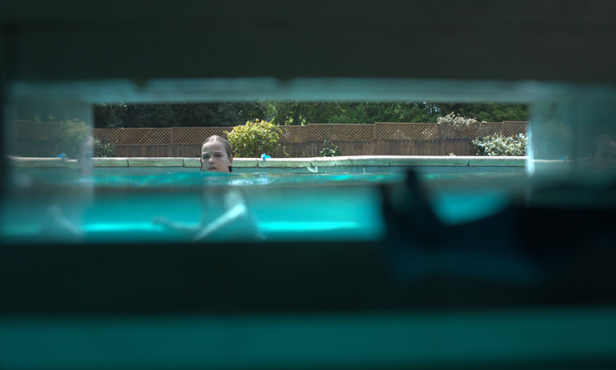The swimming pool is all at once a signifier of aspirational status, a recreational zone where relative undress is licensed, and a constructed, contained replica of wilder waters. While many films take a quick dip in the swimming pool, there are relatively few which do lengths in them for most of their duration. In Frank Perry’s The Swimmer (1968), a sequence of pools is the long way back to a suburban middle-class bliss that may be mere mirage. In Jacques Deray’s La Piscine (1969), a pool offers, beneath its sunny surface allure, a deep end of jealousy and control. In François Ozon’s Swimming Pool (2007), a pool becomes a blocked writer’s fluid space of fantasy and desire. In Ping Lumpraploeng’s The Pool (2018), it is the improbable hunting ground for a trapped, broody, hungry crocodile. And now in Bryce McGuire’s Night Swim, a suburban swimming pool is simultaneously everything a fragile family could wish for, and an overwhelming, suffocating nightmare.
We know right from the 1992-set prologue in which little Rebecca (Ayazhan Dalabayeva) is enticed at night by supernatural forces into a back-garden swimming pool from which she will never emerge, that there is something ghostly and malevolent beneath the ground level of house 1814. Now, decades later, the Wallers move in. A former pro baseballer, Ray (Wyatt Russell) is a conflicted man, all at once increasingly immobilised and incapacitated by the advances of multiple sclerosis, and willing to do anything to get back into the game even if it means impossibly overcoming the realities of his progressive disease, and being taken once more from his family.
Meanwhile, after a life of constant moves in support of Ray’s baseball career, the rest of his family is relieved to be able to settle down, even if the price is Ray’s illness. While completing her degree in special education, Ray’s wife Eve (Kerry Condon) takes an administrative job in the local school complex that teen daughter Izzy (Amélie Hoeferle) and younger son Elliott (Gavin Warren) now also attend. The middle and high schools ominously share their name – Harold Holt – with a former Australian prime minister who in 1967 mysteriously vanished while out swimming. As mother and children start to notice something in the water, Ray grows ever more addicted to the curative therapy – and other things – that the pool has to offer, and begins to go all Jack Torrance on his family.
Many horror films take something ordinary and familiar – a doll, a lift, a closet, a shed, a toy, a basement – and defamiliarise it into an object of terror. In Night Swim, it is the turn of a normal-seeming pool to expose the deep-seated problems welling beneath an everyday domestic arrangement. The film deploys multiple tricks to keep its aqueous antagonist interesting, from flickering lights to hair-filled pumps to the water’s own distorting, disembodied point of view (pool cam!) on events at the surface or edge – and that is before people start exhibiting black tears, black veins and black eyes to mark the muddy takeover of their bodies. The prune-fleshed ghosts of the drowned also keep floating up, increasing in number with each appearance.
Yet the effect is repetitive and overstretched (something that could not be said of McGuire’s and Rod Blackhurst’s economic 2014 YouTube short from which this has been expanded), and the sequence in which Eve crosses a bridge to seek out a previous survivor (Jodi Long) of the pool feels all at once like cliché, padding and excessive exposition. While horror often immerses itself in the absurd, here audiences will have to be unusually willing to suspend disbelief in order not to laugh out of the water the very idea of a wish-granting, people-possessing, sentient spring. Better to regard the pool as a psychological space – a liquid reflection of the unresolved tensions sinking this family, and a gaping hole of disappointment and desire that demands its fill. Like the climactic pool sequence of Tobe Hooper’s Poltergeist (1982) strained to feature length, Night Swim traces a deep American reservoir of selfishness and sacrifice to its mythic source – something that cannot simply be blocked or buried.
Night Swim will be in cinemas on 5 January. Find more reviews at SciFiNow.




